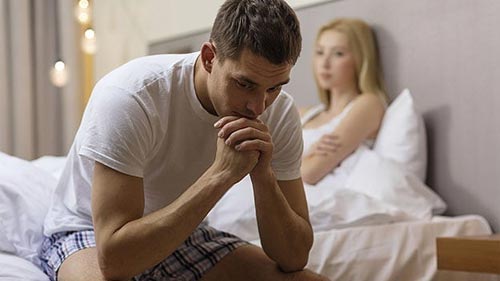
Sex should make you feel relaxed and happy. And what if it doesn’t? What if, instead of enjoying intimacy with your partner, you’re overcome by fear and worry?
Sexual performance anxiety is a common problem, especially among men. It can affect your sexual functioning, leading to problems such as erectile dysfunction, premature ejaculation, or vaginismus.
What’s Sexual Performance Anxiety?
Sexual performance anxiety happens when you worry about sexual functioning and your skills as a lover. While we all have our insecurities in the bedroom, anxiety during sex can take extreme forms. Some people are not able to have intercourse because of anxiety.
Since our body and mind are connected, sexual performance anxiety can lead to issues such as premature ejaculation in men or vaginismus in women. Sex therapists speak of sexual anxiety when the tension and stress around intimacy happen repeatedly. The problem affects up to 25% of men and up to 16% of women.
Causes of Sexual Performance Anxiety
Anxiety develops in the mind but physical problems can create anxious reactions too. For a man who has erectile dysfunction or premature ejaculation it may be difficult to tell which came first – the sexual performance issue or the anxiety around it.
Here are some of the other causes of anxiety in the bedroom:
- Conservative upbringing. People brought up in traditional families or following religious restrictions tend to have a lot of emotions around sex. Sexual anxiety may be their subconscious way of dealing with guilt around having erotic needs or engaging in sex beyond traditional marriage or heterosexual norms.
- Unrealistic vision of sex. Pornography has a big impact on sexual performance anxiety. Many people learn about sex from adult films. And these sources rarely show the reality of lovemaking, with all its challenges. If a man thinks that to be a good lover, he needs to last for hours, he will put so much pressure on himself that his body may stop cooperating.
- Body image. When celebrities dictate the ideals of beauty, it’s easy to become self-conscious about your appearance. And in sex, we can’t hide anything. Many women avoid getting naked in front of their partners because they are afraid to reveal their bodies with all their imperfections. Men also get anxious, especially around penis size.
- Relationship problems. Having a partner who criticizes you in bed can really kill sexual confidence. If you feel like every intimate encounter is a test, you may start avoiding it altogether. Besides, unresolved conflicts and challenges, such as infidelity, can take a toll on sexual performance.
Managing Sexual Performance Anxiety
Since there is no single diagnosis of sexual performance anxiety, there are no treatment options that will work for everyone. How the issue is managed will depend on the cause:
Psychological Treatments for Sexual Anxiety
Sexual performance anxiety is a type of psychological anxiety, so therapists recommend the following approaches that work for general anxiety:
Cognitive Behavioral Therapy
This type of therapy helps people understand and change their negative thought patterns. You can learn to modify your behavior and take control of your life again.
Anxiety often pushes us into panic mode, so learning ways to calm down is key to managing it. When sexual anxiety hits, you think irrationally and see the situation as scary and without a way out. Cognitive behavioral therapy gives you the tools to think clearly and look for options and solutions.
Mindfulness and Meditation Training
Sexual performance anxiety puts the body and mind into fight or flight mode. Our nervous system is on overdrive and it’s hard to relax and enjoy the erotic experience.
Eastern cultures brought us the art of meditation and today you don’t need to be a Zen master to benefit from it. If you’re not convinced about sitting on the floor and meditating, try mindfulness techniques. These are the modern methods to calm overthinking and ease fears around sexual activity.
We need more research to fully understand the link between mindfulness and sexuality but current studies suggest that practicing mindfulness can help you overcome bedroom problems.
Medical Treatments for Sexual Performance Anxiety
If your anxiety is so severe that you can’t have a satisfying sex life or if your bedroom fears are part of a generalized anxiety disorder, medical treatment could be the solution.
Anxiety Medication
Talk to your doctor about medication to help you manage anxiety without the sexual side effects such as the loss of libido. Keep in mind that every medication has its risks and you may feel unwell during treatment.
Erectile Dysfunction Pills
If you’re a man whose sexual anxiety has led to erectile dysfunction medications called PDE5 inhibitors may help. Getting your erections back can give you the confidence you need to overcome sexual performance anxiety. Before you take erection pills, talk to a healthcare provider and make sure it’s safe for you.
Premature Ejaculation Patches
Sexual performance anxiety and premature ejaculation often happen together and it’s hard to say which one came first. Men with PE can try a wearable patch called in2 to prolong intercourse. This clinically tested device stimulates pelvic floor muscles to give you more control of your ejaculation.
Seeking Help for Sexual Performance Anxiety
Sexual anxiety can feel like a trap within a trap. You’re feeling stressed and worried all the time but you’re too anxious to talk about it to anyone. As a result, you’re not getting the help that you need.
Sexual performance anxiety can be treated but you need to take the first step and tell someone. If you’re too shy to ask your doctor, gather up the courage to share your feelings with your partner. She or he may not even know what you’re going through!
Talking openly about your anxiety is the very thing that will help you overcome it. Once you have confided in someone, you will feel as if you have dropped a huge burden off your shoulders. Together with your partner, you can find professional help and treatment to help you enjoy sex without stress and fear.




